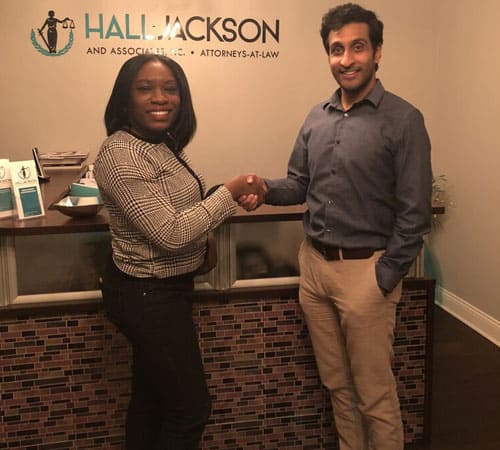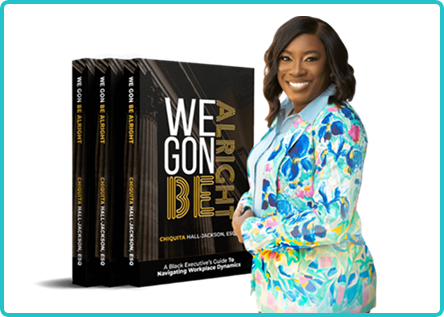Introduction: My Journey To Safeguarding Chicago’s Workers’ Rights

My journey of becoming an attorney and handling employment law cases in Illinois started when I was in high school when an internship gave me the opportunity at a young age to gain experience with a law firm. I built on this in my college years, during which time I completed another two internships and eventually went on to work at large law firms due to my deep interest in law. I am fortunate for these experiences that served as the foundation for my career, propelling me into the direction that brought me to where I am today.
The internship I had when in high school especially impacted my trajectory. My role was (understandably) considerably limited – I was a law clerk and a records clerk. During this time, I merely sorted files and put them wherever they needed to be throughout the firm. Nevertheless, I rubbed shoulders with many people in these positions, ranging from secretaries’ assistants to high-level attorneys.
I quickly noticed that so many of the associates I came across were burnt out, and others were dealing with the toll of passive-aggressive treatment others had bestowed onto them. I would even see some of the associates crying in the bathroom at times. Because of these types of encounters at such a young age, I thought that being unhappy at work due to work was the norm. I simply thought I was seeing people dealing with the reality of what was necessary to achieve a certain level of success.
Not everything was so bad, though. I was able to get some exposure and even went to a few Rotary Club dinners. At one of these dinners, a high-level executive agreed to sign their firm up to meet with law school, undergrad, and high school students to give them a sense of what the real world of a lawyer is like. Looking back, I believe that experiences like these helped me to look past the negative side of the legal world and steer me on the straight and narrow path to law school.
When I graduated from my undergrad program in May of 2006, I didn’t have any work lined up. Fortunately, my best friend was able to help me get a job relatively quickly, but just as quickly as this happened, I also got a job with the clerk of the circuit court, Dorothy Brown. So, I started as a court clerk, doing basically the same thing I had been doing in my internships before. But because this only entailed record keeping and some data entry, I didn’t feel fulfilled. I also didn’t feel as though I was progressing in my career in any meaningful way.
This led me to connect with a peer who was a law clerk at a law firm. He invited me to come over to the firm for an introduction, and fortunately for me, that simple introduction turned not only into an interview, but a new job. Based on things he had said, I was under the impression that the firm offered a great opportunity for advancement upon starting. So, naturally, I took the position and looked forward to a bright and successful future.
Interestingly, I noticed that despite the practice being a mid-sized firm of about 20 people, I was one of only three Black Americans working there. In addition to the three of us, there may have been two Hispanic people on the team, but this was pretty much it in terms of the “diversity department”. As a result, I experienced a decent amount of microaggressions while working as a law clerk. These inappropriate comments were not always so explicit, but they stuck out enough for me to take note.
Despite this, I eventually asked if I could be moved within the firm to work as a paralegal because I wanted something more challenging. (And it didn’t hurt that the paralegal at the time applied for and was accepted to law school, so they would no longer be working at the firm in the same capacity.)
When I was accepted as a paralegal, I was ecstatic. I started the new role, and it was only myself and one other young lady who was, incidentally, not a Black American. Both titled paralegals, we were very qualified to do our jobs and we did them well – we even shared office space. Interestingly enough, I would often notice her power working.
She was so often visibly frustrated, complaining of too much work. Conversely, I complained about a lack of work, there was never enough for me! I would literally send out emails asking for more to do on a daily basis. In response, I’d typically get some trivial busy work, if anything, let alone a response at all. This didn’t rub me the right way. Something seemed off.
One day, a woman at the firm had presumably sent multiple emails to my co-worker, but my colleague wasn’t responding to her because she was swamped. The woman came to our shared desk and asked my colleague, “Have you gotten any of my emails?”
“Yes, I’m sorry I haven’t gotten back to you,” my colleague replied. “I’m so overwhelmed with work right now.”
The woman pressed, “Well, I really need it done. Can you get it finished by the end of the day?”
“I really can’t take on another project,” said my colleague, exasperated. “Can you please ask Chiquita to do it?”
The woman stared at me and replied harshly, “Does she even know what she’s doing?”
Beyond this experience I’m sharing with you in detail, I was often on the receiving end of comments about my hair, my clothes, and my culture. Colleagues would regularly make questionable remarks to me about musicians, artists, public officials, and other figures who were black, as well as about black people in general.
Despite these instances of being othered and the sting they’d so often leave me with, I didn’t let them get under my skin and lead me to quit, as much as I could have justified it to myself. The truth is, I am not a quitter. Instead, I stayed the course and continued to work, doing whatever was necessary to establish a name for myself in the legal world. Instead of wavering, I internalized these experiences as challenges to show that I was obviously qualified for the position I held. Unfortunately, these experiences did not end when I eventually left the firm.
Over time, I sat on the boards of various organizations. I volunteered to be a treasurer for one, but it seemed to me that anything I would say or recommend to this board would fall on deaf ears. On another professional board, I sat as president – and despite having a much more clear and beneficial agenda than previous presidents did, hardly anyone stepped up to the plate as they were supposed to support me and the efforts I brought to the table.
All this to say, I have firsthand experience with many of the issues many people experience in the workplace. This background drives me to do all I can for my clients in their employment law-related issues and two exceptionally big cases that I won in 2015 and 2017, respectively, were especially significant catalysts to spur my practice’s success.
The first case involved an employee and a railroad company. It was pretty clear to me that age discrimination and retaliation were at play under the surface. Why? Because the employee was within just a few years of getting access to his full pension and, “coincidentally”, the company fired him on a first offense despite being there for over 20 years.
The second case involved a woman who was being sexually harassed at work. She had gone to the EEOC on her own to mediate with her employer. They initially “resolved” the issue by coming up with a contract that detailed how the aggravating party was supposed to alter their behavior at work. As things stood at that point, the one instance of harassment wouldn’t have bothered her too much. However, as a result of the company breaching the contract and not actually protecting her by getting rid of wrongdoers, several more employees and supervisors felt as though they could mistreat her and get away with it. As a result of this severe mistreatment, she went on to check herself into a 14-day mental health facility.
After winning these two big cases, I started getting more clients who needed assistance navigating major grievances in their workplace. Today, each client I work with suffers from deteriorating mental health because of what they experience at work. Seeing this has opened my eyes to the reality that most attorneys are not making effective changes with settlements, verdicts, and people going to the EEOC. Instead, these actions only leave companies feeling empowered to continue to do what they are doing because employees, more often than not, feel like they will just lose their case anyway.
Because of this, I started the Blow the Whistle Law and a social media campaign to raise awareness for workers’ rights. Drawing inspiration from Dr. Martin Luther King, Jr., I launched the campaign on January 15th, 2023, around his birthday. This social media takeover aims to encourage people to speak up and speak out whenever they see mistreatment, discrimination, or harassment in the workplace. We use the catchphrase “See something, say something – blow the whistle on discrimination and harassment.”
Unfortunately, too little is being done to address discrimination and harassment of protected classes and whistleblowers in the workplace. I hope to begin to turn the tide with my commitment to fighting for workers. As evidence of this commitment, I not only have a law firm that handles employment law cases, and lived experiences that serve as a basis in which I can empathize greatly with clients, but I go beyond with less traditional – though arguably equally effective – initiatives. No matter the method, I strive to bring the message to a larger platform.
My Focus
I offer legal services across many practice areas, but I have a special knack for employment law. Within it, I can especially be of help regarding severance package negotiations. These can significantly vary depending on the specific situation. Let’s say you love your job as an attorney, but you sit under a particular supervisor in a toxic work environment. You’ve tried everything possible to improve things, but nothing seems to stick, so you decide you just want out. You want to continue to fight on behalf of workers, just in a different place. In situations like these, we may be able to negotiate an excellent severance package. In addition to this, while you wait on your next job or think through circumstances related to the big decision of “what’s next”, I can step in and help in a variety of other ways.
I also help clients with mediation. I can directly attend mediation with you or fact-find and attend conferences with you, ideally resolving matters at that level. I can also make use of full litigation opportunities and represent you to matriculate throughout the courts to help you fight your discrimination, harassment, or whistle-blowing claims.
For more information on Handling Employment Law Cases In Illinois, a free initial consultation is your next best step. Get the information and legal answers you are seeking by calling +1 (888) 5WHISTLE today.
Contact our Chicago office if you are experiencing workplace discrimination so that our attorneys can assist you in holding the employer accountable for its actions.
Do not wait, Contact our office today

Our Commitment To You
We serve as a diverse group of trusted advisors for employees and have been dedicated and committed to finding solutions for our client’s legal issues and serving as their fierce advocate in and out of courts. There are strict deadlines for filing a lawsuit of which you must be mindful. Do not miss out on the opportunity to hold your employer accountable for its unlawful actions. Unsure of the next steps to take? Call us for a consultation.
Do not wait, Contact our office today
“The time is always right to do what is right.”
— MARTIN LUTHER KING JR.
We are here to help!
Complete our questionnaire and get started.

